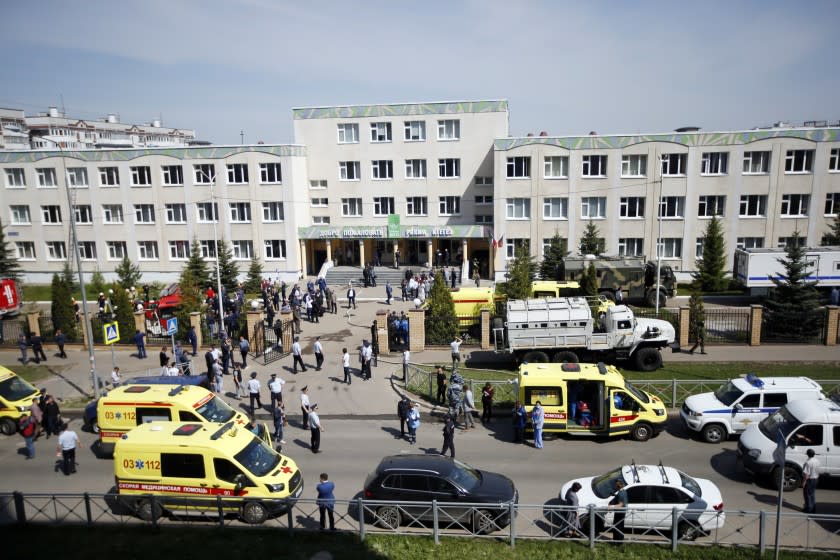Opinion: Policymakers in Russia also balk at gun control

The U.S. may have a particularly bad problem with mass shootings, but it's hardly the only country struggling to prevent them. On Tuesday, Russia experienced one of the deadliest shootings in the last three years. Authorities say a 19-year-old gunman opened fire in a school in Kazan, a city about 450 miles east of Moscow, killing nine people, including seven eighth-graders, and wounding over 20 individuals.
The attack was very similar to American school shootings. Police allege that the gunman, whom they identified as Ilnaz Galyaviev, was a former student at the school. The Associated Press reports that several days before the incident, Galyaviev created a channel on the Telegram messaging app where he called himself "a god" and stated that he wanted others to be his slaves. On the day of the shooting, the AP reported, he warned that he would kill a large amount of "bio-waste." It's reminiscent of the Columbine shooting in 1999; one of the killers, Eric Harris, wrote in his diary: "I feel like God and I wish I was, having everyone being officially lower than me."
Another similarity is the government's reaction, which is very promising in the beginning, but doesn't lead to any improvements in the end.
After the shooting, Russian President Vladimir Putin ordered the National Guard to tighten gun laws. In particular, he said there should be more limits on the types of weapons that civilians can use. Kremlin spokesman Dmitri Peskov explained that Russians buy assault rifles and register them as hunting guns. However, according to him, this is not appropriate and should be changed.
Also, in response to the tragedy, government officials and parliament members offered to increase the minimum age to purchase weapons to 21 and restrict access to guns by people with multiple felony convictions.
It might sound like legislators are going to work hard now on reforming the gun laws. However, the same discussions happened in 2018, after authorities say 18-year-old Vladislav Roslyakov killed 20 people at a college in Crimea with the same gun type as Galyaviev is accused of using, the semiautomatic Hatsan Escort shotgun. Gun policy hasn't changed since. All the bills that were supposed to tighten gun regulations were rejected.
In the U.S., state and federal lawmakers have introduced as many as 2,000 gun control bills a year. Most of them failed, and so far, no significant changes have been made as well. More than 500 people died in mass shootings last year in the U.S. More than 200 mass shootings (incidents in which at least four people other than the gunman are wounded or killed) have already occurred this year. And after each shooting, the demand for weapons only increases. So, there are no reasons to hope that situation will get better by itself. Instead of postponing gun regulation forever, indecisive governments should learn from the countries that acknowledged that only radical changes could stop mass shootings.
New Zealand can serve as an example. Its Parliament banned "military-style" semiautomatic and automatic weapons in 2019 after a lone gunman, Brenton Tarrant, killed over 50 worshipers at two Christchurch mosques. Authorities also launched a buyback program so that owners could turn their guns in and be compensated. The government collected around 60,000 weapons. Since only one-third of the population's guns were turned in, experts were split over the success of this measure. Authorities heard the feedback and managed another buy-back program this year, which ran from February until May. Its results have not been disclosed yet. But so far there were no reports from New Zealand about new mass shootings.
Buyback programs on their own haven't been very successful, but research suggests they can be effective as part of a broader gun-control initiative. If Russia or the U.S. introduced such bans and buyback programs, it could affect not thousands, but millions of weapons (Russians own around 7 million guns and Americans an estimated 390 million). Countries are not going to set a record for the quick response like New Zealand (it took the Parliament only 26 days to pass a law about the gun ban) since discussions about gun control already last for years. However, it's never too late to start trying to put an end to gun massacres. There is no need to wait for another deadly mass shooting.
This story originally appeared in Los Angeles Times.

